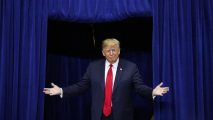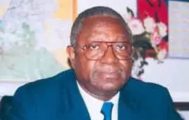Categories
Recent Posts
- Football: Gabon forward Boupendza dies aged 28 in China
- Cameroonian youth urged to embrace hope despite multiple challenges
- Bishop of Bafoussam calls on voters to ‘make no mistake’ in this year’s election
- World Bank increases funding to Cameroon by 21%
- Ukraine: Trump blames Zelensky for starting war after massive Russian attack
Archives
- April 2025
- March 2025
- February 2025
- January 2025
- December 2024
- November 2024
- October 2024
- September 2024
- August 2024
- July 2024
- June 2024
- May 2024
- April 2024
- March 2024
- February 2024
- January 2024
- December 2023
- November 2023
- October 2023
- September 2023
- August 2023
- July 2023
- June 2023
- May 2023
- April 2023
- March 2023
- February 2023
- January 2023
- December 2022
- November 2022
- October 2022
- September 2022
- August 2022
- July 2022
- June 2022
- May 2022
- April 2022
- March 2022
- February 2022
- January 2022
- December 2021
- November 2021
- October 2021
- September 2021
- August 2021
- July 2021
- June 2021
- May 2021
- April 2021
- March 2021
- February 2021
- January 2021
- December 2020
- November 2020
- October 2020
- September 2020
- August 2020
- July 2020
- June 2020
- May 2020
- April 2020
- March 2020
- February 2020
- January 2020
- December 2019
- November 2019
- October 2019
- September 2019
- August 2019
- July 2019
- June 2019
- May 2019
- April 2019
- March 2019
- February 2019
- January 2019
- December 2018
- November 2018
- October 2018
- September 2018
- August 2018
- July 2018
- June 2018
- May 2018
- April 2018
- March 2018
- February 2018
- January 2018
- December 2017
- November 2017
- October 2017
- September 2017
- August 2017
- July 2017
- June 2017
- May 2017
- April 2017
- March 2017
- February 2017
- January 2017
- December 2016
- November 2016
- October 2016
- September 2016
- August 2016
- July 2016
- June 2016
Featured
 Burkina Faso: Where vision meets discipline
Burkina Faso: Where vision meets discipline  Prosecution of journalists in Cameroon: European Parliament says enough red flags have been ignored
Prosecution of journalists in Cameroon: European Parliament says enough red flags have been ignored  1982-2025: How long will Biya hang on?
1982-2025: How long will Biya hang on?  How Biya and Archbishop Nkea protected the sanctity of the family in Cameroon
How Biya and Archbishop Nkea protected the sanctity of the family in Cameroon  October Presidential Election: Will 92-year-old Biya be re-elected?
October Presidential Election: Will 92-year-old Biya be re-elected?
Most Commented Posts
 4 Anglophone detainees killed in Yaounde
4 Anglophone detainees killed in Yaounde
18 comments Chantal Biya says she will return to Cameroon if General Ivo Yenwo, Martin Belinga Eboutou and Ferdinand Ngoh Ngoh are sacked
Chantal Biya says she will return to Cameroon if General Ivo Yenwo, Martin Belinga Eboutou and Ferdinand Ngoh Ngoh are sacked
13 comments The Anglophone Problem – When Facts don’t Lie
The Anglophone Problem – When Facts don’t Lie
12 comments Anglophone Nationalism: Barrister Eyambe says “hidden plans are at work”
Anglophone Nationalism: Barrister Eyambe says “hidden plans are at work”
12 comments Largest wave of arrest by BIR in Bamenda
Largest wave of arrest by BIR in Bamenda
10 comments
Latest Tweets
Featured
-

Football: Gabon forward Boupendza dies aged 28 in China
-

Cameroonian youth urged to embrace hope despite multiple challenges
-

Bishop of Bafoussam calls on voters to ‘make no mistake’ in this year’s election
-

World Bank increases funding to Cameroon by 21%
-

Ukraine: Trump blames Zelensky for starting war after massive Russian attack
-

Minister Obi Eta Jerome’s death – What do we know?
-

Pope Francis transfers Cameroonian-born Nigerian Apostolic Nuncio in Sri Lanka to Ethiopia
© Cameroon Concord News 2025
9, February 2023
Journalist Martinez Zogo’s murder may trigger regime change in Yaoundé 0
The nation has been run by the same man, Paul Biya, for decades. But as the 89-year-old fades from public view, high-stakes maneuvering is underway, which may have led to the brutal murder and mutilation of a well-known journalist.
Martinez Zogo was a journalist at Amplitude FM, an independent radio station in Cameroon’s capital, Yaoundé — and he became well-known for denouncing corruption. On Jan. 22, Zogo was found dead at the age of 51 — his body was severely mutilated.
From the moment the killing was reported, this central African nation of 27 million has been plunged into fear and a deep, potentially fatal regime crisis.
On Monday, one of Cameroon’s most prominent businessmen, Jean-Pierre Amougou-Belinga, was arrested at his home by about 100 security agents, who first had to neutralize his ten or so bodyguards. Amougou-Belinga is suspected of being the mastermind behind the journalist’s murder.
But that was just one in a series of arrests made in recent days, including the head of Cameroon’s counterintelligence service, as well as several members of the intelligence services. Reporters Without Borders, which has been investigating the case, reports that it has seen the statement of the Director of Special Operations of the counterintelligence service, Justin Danwe, who acknowledges his involvement. The Paris-based organization for the protection of journalists thus issued a statement that Zogo’s murder was a crime of the state.
Other journalists were reportedly threatened, including Haman Mana, director of the daily newspaper Le Jour, whom Martinez Zogo had visited a few days before his disappearance and who’d been told he would be next “on the list.”
Threat of instability in a key African country
If this were only a matter of settling scores over corruption, it would already be quite sordid; but everything seems to indicate that it goes far beyond that, that we instead are witnessing the war of political succession taking place in Cameroon.
The country’s President, Paul Biya, who will soon be celebrating his 90th birthday, has run the country for more than 40 years — a record! For a long time now, he has been an “interim” president, passing lengthy stays in Switzerland, meeting only once or twice a year with the Council of Ministers.
The country could be one of the continent’s engines of growth.
This transition has thus left a lot of room for officials to compete for influence, including the all-powerful Secretary General of the Presidency, Ferdinand Ngoh Ngoh. It is still too early to know how this murder and subsequent arrests fit into these maneuverings, but it appears that the stakes are clearly high enough to kill, denounce and betray.
Cameroon is a key country in central Africa, and it is in no one’s interest to see it sink into even greater instability as the end of Biya’s long reign continues to drag out.
Boko Haram and oligarchs
The northern part of the nation, bordering Lake Chad, continues to face the threat of Boko Haram jihadists. The English-speaking West is in the grip of a civil war that has been going on for years, due to failures by the central government to keep its promises. All the while, much of Cameroon’s wealth is being captured by a predatory oligarchy.
And yet, it is an oil-rich, agricultural and modestly industrial country that could be one of the continent’s engines of growth. Its fate is of sufficient concern to its partners that French President Emmanuel Macron went there last summer, at the risk of appearing to support Biya, whom he has also criticized on repeated occasions.
Last week, several Cameroonian personalities from the diaspora as well as from within the country called for a national dialogue in an article in the French daily Le Monde before, they said, “a catastrophe occurs.” With the latest news, one wonders if the catastrophe has not already begun.
Source: Worldcrunch